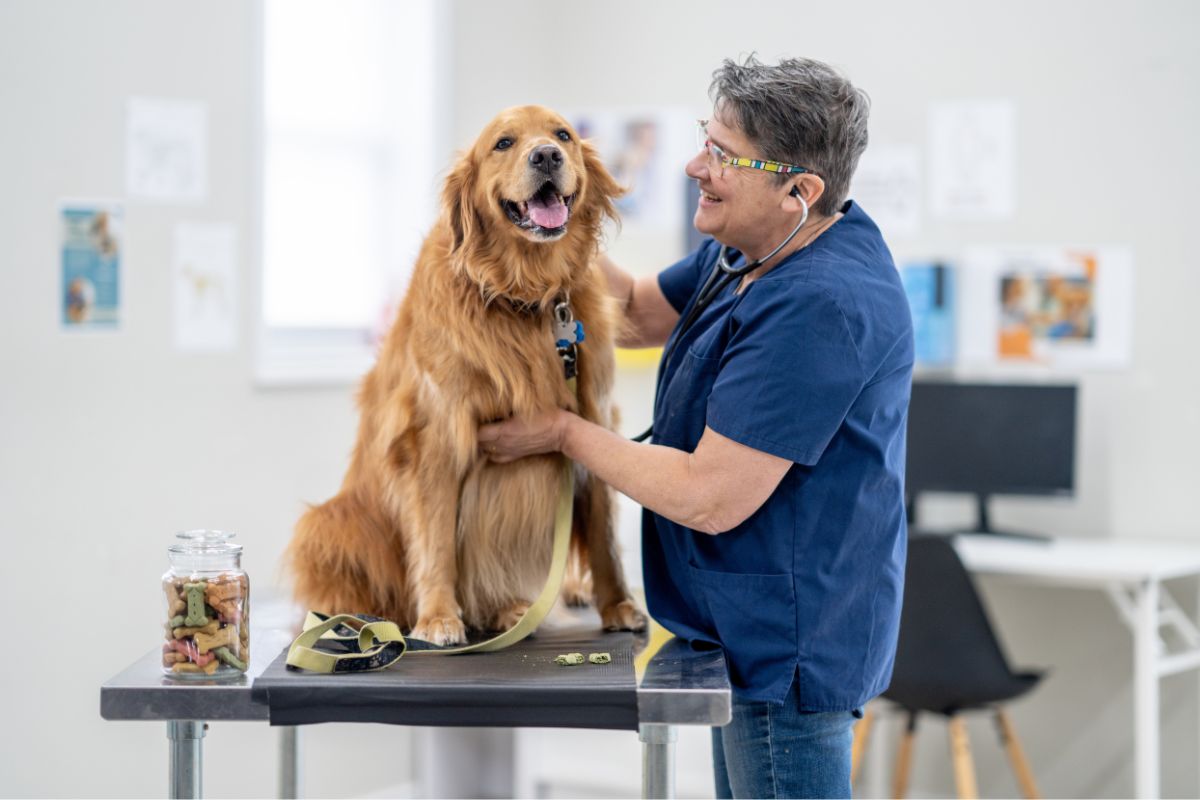As pet owners, we want the best for our furry friend. And we especially want them to live long, healthy and happy lives. One common question we hear a lot from new pet parents is: “How often should I take my pet to the vet?”
Our recommendation is for pet owners to visit your vet at least twice a year.
In this guide, we’ll explore the reasons why it’s important to schedule regular vet visits for cats and dogs of all ages.
Regular vet check-ups are important
While it’s tempting to only visit the vet when our furry friends are visibly unwell, regular pet check-ups are essential for maintaining overall health and wellbeing.
“When examining pets, vets often identify problems that you as a pet parent may be unaware of, such as dental disease, heart murmurs, and early signs of arthritis,” says Dr Rachel Dickie “By identifying these problems early, it allows for prompt intervention and treatment.” We recommend scheduling six-monthly visits, especially for older dogs and cats.
Vet tip: schedule your half-yearly appointments in advance. Six months can come around fast so if you have your visits marked on your calendar and in your diary, you’re less likely to forget to make the appointment in the first place.
Quick links:
How often should I take my puppy or kitten to the vet? How often should I take my adult pet to the vet? How often should I take my senior pet to the vet?
How often should I take my puppy or kitten to the vet?
Getting a head start on veterinary care is essential for your pet to build a solid foundation for lifelong health. Your puppy or kitten’s first vet visit should ideally occur within the first few weeks of bringing your new furry friend home.
During this initial visit, your vet will give your pet a thorough once-over, checking for any signs of illness or congenital conditions. They’ll also start them on their puppy vaccinations and kitten vaccinations to protect them from common infectious diseases and provide them with a dewormer to eliminate any pesky internal parasites.
But it’s not just about medical checks and vaccinations. These consistent check-ins are also an opportunity for pet parents to get crucial advice on pet care essentials like nutrition and behaviour training. Your vet will also talk to you about the benefits of desexing your pet, including the best age that is suitable for their breed and size.
By taking a proactive approach to healthcare right from the start, you’re laying the groundwork for a healthy and happy adult pet. Plus, regular check-ups during the early stages of life allow for ongoing monitoring of your pet’s growth and development, giving vets the chance to catch and tackle any emerging health issues early on.
Vet tip: Scheduling six-monthly appointments with your vet from the very start of your pet ownership journey allows your pet to feel familiar with the process of visiting the vet and develop a bond with the staff at your local clinic. This is an important step in socialising your cat or dog in their early years – making them less anxious during vet visits.
How often should I take my adult pet to the vet?
Once your pet reaches adulthood, typically around 18 months of age, half-yearly vet visits become increasingly important. These visits allow your vet to monitor your pet’s overall health and discuss preventive care measures such as parasite control and dental health.
During these appointments, vets perform thorough check-ups to make sure your pet is healthy and catch any potential issues early. Your vet will also review and update vaccination plans to keep your pet protected from diseases.
But these visits aren’t just about health check-ups, they’re also a chance for you to chat with your vet about ways to keep your furry friend healthy and happy.
Whether it’s starting a dental care routine, talking about weight management or parasite prevention, taking these proactive steps is crucial for keeping your adult pet happy and healthy. Plus, your vet might suggest some routine blood work or screenings to catch any hidden health issues early.
How often should I take my senior pet to the vet?
As our pets age, their healthcare needs evolve, requiring more frequent monitoring and specialised care. Senior pets, usually aged seven years and up, need extra attention to make sure they’re comfortable and happy as they enter their golden years. Regular vet visits become important for senior pets, giving vets a chance to keep a close eye on any age-related issues and step in quickly if anything pops up.
During a senior pet check-up, your vet will give your furry friend a thorough physical examination. Your vet might suggest blood tests or imaging to get a full picture of your senior pet’s health. Common senior pet problems like arthritis, dental issues, lumps and bumps are watched closely and treated with a mix of medication, lifestyle tweaks and extra love and care. Plus, your vet might recommend changes to your pet’s diet to make sure they’re getting all the right nutrients. Senior pets may need additional support with diet as it’s common for them to put on weight as they age – which puts them at risk of such things as arthritis, heart disease and diabetes.
Vet tip: Whether you’re concerned about changes in your pet’s appetite or energy levels or the onset of unusual symptoms, addressing these issues early can prevent them from developing into more serious health concerns.
The benefits of a Wellness Plan
For pet owners committed to providing the best possible care for their furry companions, a wellness plan can be a valuable investment. Best For Pet offers a comprehensive wellness membership program that includes unlimited vet consults, discounted services and access to a network of veterinary experts. Pet owners can ensure their pets receive regular veterinary care without breaking the bank.
Regular vet visits are a must
Remember, when it comes to your pet’s health, proactive care is key. Schedule those half-yearly vet visits and stay up to date on vaccinations and preventive care.
Regular vet visits are an important part of responsible pet ownership, allowing vets to monitor your pet’s health, detect any potential issues early and provide timely interventions. With regular twice-yearly vet visits, you’re giving your pet the gift of good health and investing in a lifetime of tail wags and purrs.
To help you navigate your pet’s healthcare journey at every stage of their life, book an appointment with your vet.








